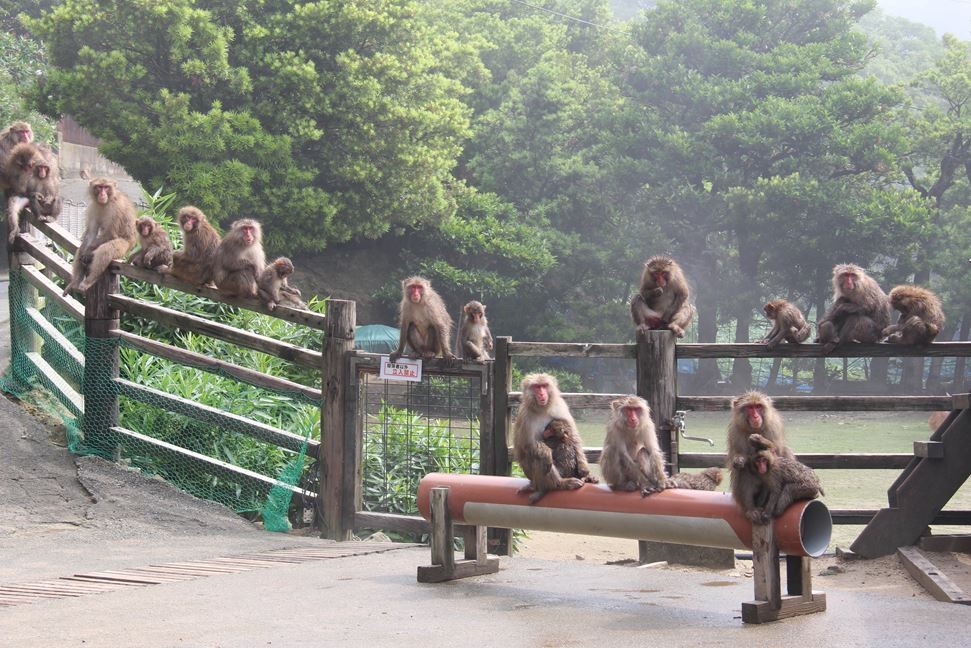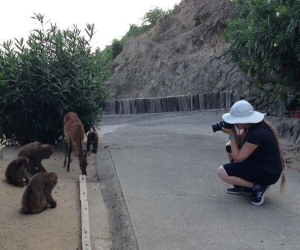We are an interdisciplinary lab group, with shared interest in how human-caused environmental change is influencing animals, especially nonhuman primates. Our primate-focused research is mostly based on field research at the Awajishima Monkey Center on Awaji Island in Japan, and in the Atlantic Forest region and Caatinga biome in northeastern Brazil. We collect field data on a variety of topics including, behavioural responses to physical impairment and disability, behavioural plasticity, movement patterns and decisions, habitat use and quality, social dynamics, rehabilitation and release, behavioural complexity, and maternal behaviour. Work in our group also includes conservation, climate change impacts on primates and other animals, habitat suitability, farmed animals, animal welfare, human-animal interactions, conflicts and coexistence.
Primatology & Interdisciplinary Environmental Studies (PIES) Lab

Media
Instagram, check out:
@pies_lab_concordia; @mikaelaswildlife; @operacaosapajus; @broganstewartprimates
Brogan Stewart, Concordia Public Scholar: https://www.concordia.ca/gradstudies/professional-development/public-scholars/profiles/brogan-stewart.html
LinkedIn:
Sarah Turner https://www.linkedin.com/in/sarah-turner-267a5957/
Yisa Ginath Yuh https://www.linkedin.com/in/yisa-ginath-yuh-9078aa212/
Stephanie Eccles https://www.linkedin.com/in/stephanie-eccles-3983b2137/
Brogan Stewart https://www.linkedin.com/in/brogan-stewart/
Megan Joyce https://www.linkedin.com/in/megan-joyce-1bb68560/
Mikaela Gerwing https://www.linkedin.com/in/mikaela-gerwing/
Jack Creeggan https://www.linkedin.com/in/jack-creeggan-658b5617a/
Ariana Moin Kenary https://www.linkedin.com/in/ariana-moin-kenary-b9654b239/
Ariane Peroni https://www.linkedin.com/in/ariane-peroni-1833561a3/
Cristina Sciortino https://www.linkedin.com/in/cristina-sciortino-18596312a/

Sarah E. Turner (PhD University of Calgary, 2010)
Associate Professor
Sarah Turner is interested in how the behavioural ecology of nonhuman primates is influenced by human-induced environmental change. She studies the behaviour of free-ranging Japanese macaques (Macaca fuscata) with physical disabilities to explore hypotheses related to behavioural plasticity, mother-infant interactions, dominance rank, and social behaviour in collaboration with the Awajishima Monkey Center in Japan. She also works in collaboration with Dr. Renata Ferreira at UFRN in Natal, Brazil, on rehabilitation of captive bearded capuchin monkeys (Sapajus libidinosus), and the behavioural ecology of Endangered blond capuchin monkeys (Sapajus flavius) in a small fragment of Atlantic Forest. Sarah obtained her PhD in Anthropology (Primatology) from the University of Calgary, and held a postdoctoral fellowship in the Department of Biology at McGill University before joining Concordia in 2017.
Current Research Projects
Sarah works on three main research projects under the umbrella of primate behavioural plasticity and anthropogenic environmental change:
1) Disability, physical impairment and behavioural plasticity in free-ranging Japanese macaques (Macaca fuscata). Field site at the Awajishima Monkey Center, Awaji Island, Japan, in collaboration with the Toshikazu and Hisami Nobuhara, and Dr. Kazunori Yamada and Dr. Masayuki Nakamichi at Osaka University.
2) Linking behavioural plasticity, personality and welfare in rehabilitation and release of bearded capuchins monkeys (Sapajus libidinosus). Field sites in northeastern Brazil, in collaboration with Dr. Renata Ferreira, Universidade Federal do Rio Grande do Norte.
3) Behavioural plasticity, use of space, and habitat in a fragmented environment among Blond capuchins (Sapajus flavius). Field site in the Atlantic Forest region of northeastern Brazil, in collaboration with Dr. Renata Ferreira, Universidade Federal do Rio Grande do Norte.
Sarah is also a co-investigator in the Leadership in Environmental and Digital Sustainability (LEADS) program, supported by NSERC-CREATE (PI Damon Matthews). This program provides additional training and funding for many of her students. LEADS sits at the intersection of Digital technologies and sustainability sciences, and involves training in advanced digital tools, leadership and communications skills building, and networking opportunities: https://sustainabilitydigitalage.org/leads/
Current students
| Yisa Ginath Yuh | Postdoc | Habitat fragmentation and climate change in the Congo Basin: Mapping and quantifying effects on single and multi-species distribution and behavioral diversity within Congo Basin landscapes and protected areas | Damon Matthews |
| Megan Joyce | PhD | Foraging route-choice decisions in free-ranging Japanese macaques: Implications for heuristics, behavioural plasticity, and selection | Pierre-Olivier Montiglio UQAM |
| Mikaela Gerwing | PhD | Rehabilitation of captive capuchin monkeys (Sapajus libidinosus): Animal personality and reintroduction success | Renata Ferreira UFRN |
| Stephanie Eccles | PhD | Making animal waste essential: ‘Renewing’ animal agriculture through the fraught politics of renewable natural gas development | Elisabeth Stoddard WPI |
| Brogan Stewart | PhD | Movement complexity of physically impaired Japanese macaques Present Position: PhD Student, Concordia University | |
| Ariana Moin Kenary | MSc | Foraging route choice decisions among urban squirrels | |
| Ariane Peroni | MSc | Fallback food foraging skills for survival among Endangered blond capuchins (Sapajus flavius) in an Atlantic Forest fragment | Renata Ferreira UFRN |
| Jack Creeggan | MSc | Behavioural flexibility and conservation in endangered blond capuchin monkeys (Sapajus flavius) in an urban forest fragment, Brazil | Renata Ferreira UFRN |
| Italo Pereira | MITACS Globalink Visiting Scholar | Habitat suitability and home range in blond capuchins (Sapajus flavius) | Renata Ferreira UFRN |
| Cristina Sciortino | Honours (Geog 491) | Influence of dog parks on dog behaviour and welfare | |
| Ines Soares | MITACS Globalink Visiting Scholar | Moving home: Improving reintroduction outcomes and human-capuchin monkey coexistence in Brazilian caatinga and forest fragments | Renata Ferreira UFRN |
Former students
| Name | Degree | Research Area | Year | Co-supervisor |
|---|---|---|---|---|
| Siobhan Knowles | MEnv and MITACS Internship | Human-animal conflict in Environmental Assessment: A case study of bat translocation success on Vancouver Island, B.C. | 2023 | |
| Veronica Ventulieri | Undergraduate Science College | Comparing behaviour frequencies between disabled and nondisabled female Japanese macaques (Macaca fuscata) | 2023 | |
| Jennifer Donnini | Honours (Geog 491) |
Identifying suitable habitats for the reintroduction of capuchin monkeys (Sapajus spp.) in northeastern Brazil’s Caatinga Biome | 2023 | with Angela Kross & Renata Ferreira |
| Caroline Lesage | MSc | Habitat suitability, space use, and human-wildlife coexistence for wild river otters (Lontra canadensis) | 2023 | |
| Anna Krupa | Honours (Geog 491) |
Evaluating regional and local scale methylmercury exposure from fish consumption: A follow-up risk assessment in the Eeyou Istchee territory of northern Quebec, Canada | 2023 | Robert Moriarity |
| Yisa Ginath Yuh | PhD | Application of machine learning to quantify forest cover loss in the Congo Basin and its implications for large mammal habitat suitability | 2023 | Damon Matthews |
| Mikaela Gerwing | MSc | Rehabilitation of captive capuchin monkeys (Sapajus libidinosus): Animal personality and reintroduction success | 2023 | Renata Ferreira UFRN |
| Claudia Del Fabbro | Undergraduate research (Geog 498) |
River otter behaviour: Measuring behaviour and activity budgets using trail cameras and scan sampling | 2023 | |
| Kyle Miller | MITACS Globalink Scholar & Geog 498 |
Mapping capuchin monkey movement in an urban forest fragment | 2022 | Renata Ferreira UFRN |
| Kelsey Wilson | Undergraduate research volunteer | Japanese macaques infants and disability; Route choice among urban squirrels | 2022 | |
| Megan Joyce | MSc | Optimal foraging travel route choice and physical impairment in free- ranging Japanese macaques | 2022 | |
| Faye Sun | Undergraduate research (Geog 498) |
Intersections between animal and human migration | 2021 | |
| Caroline Lesage | Honours (Geog 491) |
Behavioural correlates of alopecia in captive Japanese macaques | 2021 | |
| Sophie Mortimer | Honours (Geog 491) |
A case study of infant theft and co-mothering in free-ranging Japanese macaques | 2021 | |
| Brittany Talarico | Undergraduate research (Geog 498) & volunteer | Exploratory behavior of disabled infants in a free-ranging group of Japanese Macaques (Macaca fuscata) | 2021 | |
| Juliette Penez | MSc Research Intern | How do animals deal with physical disabilities? An annotated bibliography | 2020 | |
| Xiaolan Sun | Menv | Integrating life cycle assessment in China’s sustainable development: A case study of the cashmere industry | 2020 | |
| Eva-Maria Hanchar | BSc Honours | Calculating carbon footprints: Influences on individual climate-related behavioural choices | 2020 | Damon Matthews |
| Anna-Karina Poronovich | BA Honours | Protest Signs at the September 27th Climate March: A Research Creation Ecofeminist Analysis and Online Archive | 2020 | Nalini Mohabir |
| Michael Cortese | Menv | Safeguarding biodiversity hotspots through protected areas in Sub- Saharan Africa | 2019 | |
| Carolina Videira | Undergraduate Science College | Grooming behaviour in Japanese macaques at the Granby Zoo | 2019 | |
| Hannah Brown | BA Research | Butterfly garden habitats and pollinator diversity in Montreal | 2019 | |
| Jenny Paola Espitia Contreras | BSc Honours | Assessing the effects of congenital limb malformations on social grooming techniques and efficiency of free-ranging Japanese macaques | 2019 | |
| Brogan Stewart | Honours (Geog 491) |
Emergence of novel climate regimes across primate species habitat ranges | 2018 | Damon Matthews |
| Audréanne Pelletier | BSc Honours | Effect of physical disability on feeding efficiency in Japanese macaques | 2018 | |
| Zachary Masson | BA Honours | Smartphone Ecology: Measuring Plant Stress Using Smartphone Applications | 2018 | Catherine Calogeropoulos |
| Adrienne Kotler | BSc | Manual disability and provision feeding efficiency in Japanese macaques | Simon Reader | |
| Tanya Graham | BSc Honours | Assessing the impacts of climate changes on non-human primates | Damon Matthews |

Current Opportunities in the PIES Lab
Graduate Studies: I am looking for enthusiastic graduate students who are interested in primate behavioural ecology and conservation. In particular, I am looking for graduate students who want to conduct field research in primate behavioural ecology in Japan or Brazil. I will be accepting one or two graduate students a year. Students with quantitative skills, fieldwork and animal behaviour experience are encouraged to apply. Previous training in Geography, Biology, Biological Anthropology or Environmental Science are all appropriate undergraduate backgrounds for research in my lab group. Applicants for graduate studies go through a competitive application process through the Department of Geography, Planning and Environment at Concordia University. If you are interested in the MSc or PhD programs here, and are interested in working with me, please contact me prior to submitting your application to the university.
Undergraduate Honours: I am looking for one undergraduate honours student each year (GEOG 491). Honours student projects can either involve analysis of previously collected video data on Japanese macaques, research using existing primate datasets (e.g. IUCN data), research projects related to local urban ecology, animal behaviour, environmental science, environmental studies, biodiversity and sustainability science, or collaborative interdisciplinary projects co-supervised with other GPE faculty. Undergraduate students interested in pursuing honours research should contact me directly for an appointment.
Undergraduate volunteers: Sometimes we have opportunities for undergraduates to gain research experience by volunteering on graduate and honours projects. Volunteer opportunities include data processing, trail camera photo and video analysis, and social media and science communication opportunities.





